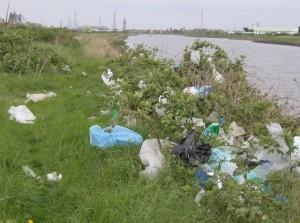 We’ve talked about plastic bag bans in the United States (specifically, in L.A., Seattle, and D.C.), but plastic bags are frequently even more of a problem in developing countries. Starting November 23, Delhi, India’s second biggest city, will introduce a complete ban on the storage, sale, and manufacture of plastic bags, film, and packaging. Only woven plastics and plastics used for biomedical waste will be exempt. City officials hope a complete ban will address the shortcomings of a 2009 partial ban on plastic bags, and alleviate growing pollution and waste treatment concerns.
We’ve talked about plastic bag bans in the United States (specifically, in L.A., Seattle, and D.C.), but plastic bags are frequently even more of a problem in developing countries. Starting November 23, Delhi, India’s second biggest city, will introduce a complete ban on the storage, sale, and manufacture of plastic bags, film, and packaging. Only woven plastics and plastics used for biomedical waste will be exempt. City officials hope a complete ban will address the shortcomings of a 2009 partial ban on plastic bags, and alleviate growing pollution and waste treatment concerns.
Looking at the statistics, there’s no question that plastic bags are a growing problem in Delhi. A 2011 study by the South Asian Network for Development and Environmental Economics (SANDEE) found that the amount of plastic bags in the municipal waste stream has grown by a factor of 16—to over 9 percent—between 1996 and 2005. Over half of this plastic is attributed to plastic bags and packaging. Irresponsible disposal of plastic bags has led to a host of problems, including clogged urban sewage systems, and hazards to the environment and wildlife.
However, it’s not clear whether a ban alone will solve these issues. After conducting an experiment to look for alternatives, the aforementioned SANDEE report proposes that a more balanced, multifaceted approach, rather than an all-out ban, would be more effective. The authors looked at how plastic bag use would be affected by 3 distinct tactics: providing information about plastic bags’ impact on the environment, introducing a cash-back system, and providing cheap substitutes for plastic bags. It was found that the cash-back scheme had the largest impact on reducing plastic bag use (5.5 percent), followed by cotton bag substitutes (4.5 percent), and information (3.5 percent). While these recommendations are certainly not as ambitious as a plastic bag ban, the authors believe their recommendations are more realistic and help create an incentive-based, market-friendly system.

